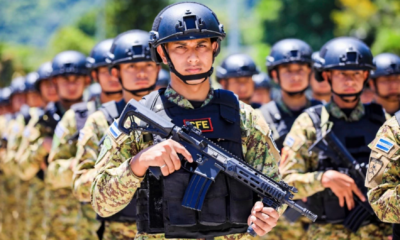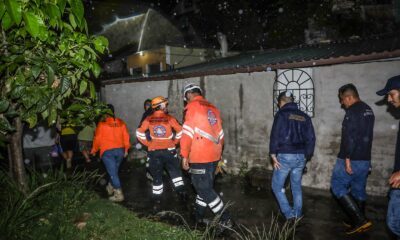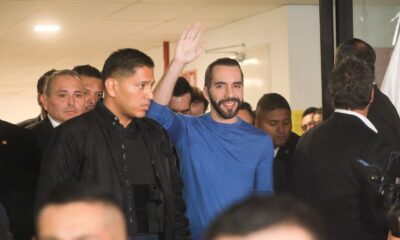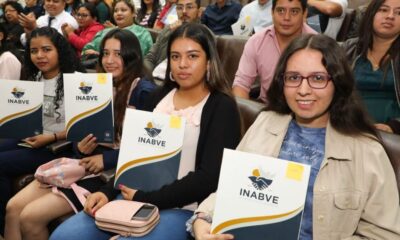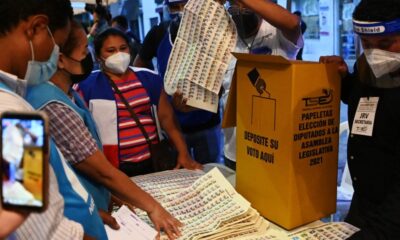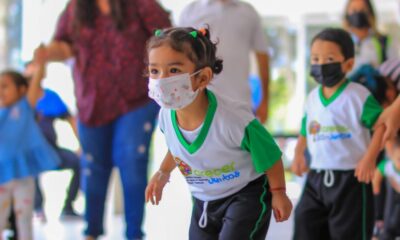Central America
Trial begins against 10 accused of helping Funes to appropriate more than $351 million
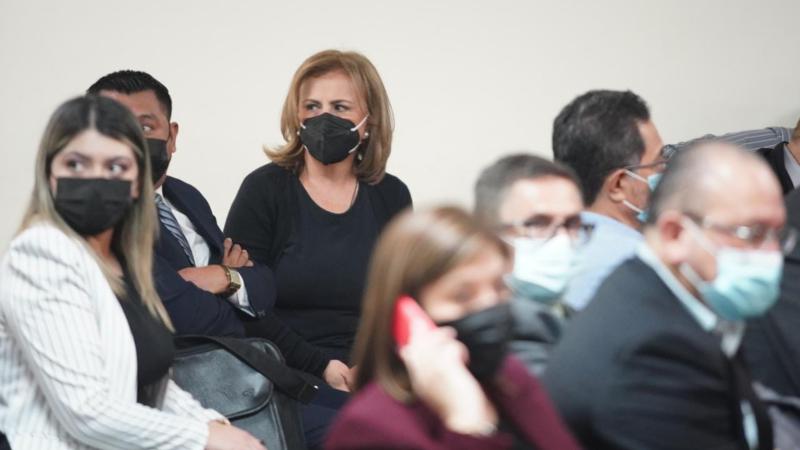
August 15|
In the case known as “Public Pillage” the First Sentencing Court of San Salvador, has begun this Tuesday the public hearing against 10 defendants linked to the corruption network that created the former president of the Republic, Mauricio Funes.
The Public Prosecutor’s Office of the Republic accuses for the crimes of money laundering, embezzlement (appropriation of state property) and special cases of money laundering.
The Public Prosecutor’s Office has more than 2,500 documents, 114 witnesses, financial and tax accounting experts and 21 international assistances, which were admitted in the preliminary hearing and which will begin to be evaluated by the court in the trial scheduled for one month.
The prosecutors intend to prove with financial, accounting and tax expertise that the defendants allegedly appropriated public funds that the Ministry of Finance allocated to the Presidency of the Republic for the reserved expenses between 2009 and 2014.
One of the key expertise is the accounting analysis made by an expert where he confirms that Funes in his presidential term used the mechanism of budgetary reinforcements to appropriate $351,035,400.
This expertise called “Forensic Financial Accounting Audit of Administrative and Functional Management” shows that in the records of the Ministry of Finance, between June 1, 2009 and June 1, 2014, it appears that the budget for the Reserved Expenses item that the Legislative Assembly approved for the Presidency of the Republic was $80,818,285.
But Funes, not satisfied with these funds, devised a criminal plan to increase the secret item known as “Item 54315 Reserved Expenses” through budgetary reinforcements.
The increase was 300% equivalent to $270,217,115.49, leading him to appropriate $351,035,400.49, in his entire administration and the people who today begin to be prosecuted were part of that criminal structure, according to the accusation of the Prosecutor’s Office. Funes fled justice in 2016 to Nicaragua.
As the plan was to lose track of those funds delivered as reserved expenses to the Presidency of the Republic, from the subsidiary account of the public treasury the money began to be transferred to accounts that were in the name of private individuals in the Banco Hipotecario.
The holders of these private accounts were Francisco Rodríguez Arteaga and Pablo Gómez, who were in charge of depositing the money through checks. These two people were also part of the network used by former President Antonio Saca.
According to the Public Prosecutor’s Office, these actions are serious because the accused violated the administrative regulations that already determine the mechanisms to be followed in the management of public funds.
The private attorneys at the time of initiating the trial have presented several petitions. One of them is a peremptory exception of res judicata in the case of Vanda Pignato.
The defense says that she was already judged in a civil trial for illicit enrichment of $135,536.15, funds with which she paid credit cards and other financial products, in that lawsuit she was absolved of responsibility and in this process of Public Plunder are the same facts accused which becomes a double judgment and that she be exonerated for the crime of money laundering.
The defense has also requested the exclusion of José Francisco Cáceres Saldaña, former private secretary of Mauricio Funes, as he was not duly granted the status of criterion witness.
They have also requested that some documents handed over by Cáceres Saldaña not be evaluated since the proper chain of custody was not followed.
They are also requesting not to take into account a point of expertise of a financial accounting analysis made on the reserved expenses and which affects David Rivas, former Secretary of Communications of the Presidency.
THE PENDANTS
1 Vanda Pignato, former First Lady, accused by the Prosecutor’s Office of money laundering and simulation of crimes.
2 José Miguel Antonio Menéndez Avelar, owner of COSASE, accused of money laundering, asset laundering and tax fraud.
3 Juan Carlos Guzmán Berdugo, former father-in-law of Mauricio Funes, indicted for money laundering and asset laundering.
4 Manuel Rivera Castro, former president of Banco Hipotecario, indicted for embezzlement, money laundering and asset laundering.
5 Rigoberto Palacios Panameño, former chief accountant, faces trial for embezzlement.
6 Luis Miguel Ángel García, accused of money laundering and asset laundering.
7 Francisco Rodríguez Arteaga, former financial manager of Casa Presidencial, indicted for embezzlement, money laundering and assets laundering.
8 Pablo Gómez, former technical assistant of the Presidency, accused of embezzlement, money laundering and assets laundering.
9 Jorge Alberto Hernández Castellano, former Treasury chief of Casa Presidencial, indicted for embezzlement.
10 David Rivas, ex-secretary of Communications of the Presidency, accused of money laundering.
Central America
Costa Rica Goes to the Polls as Voters Choose Continuity or Change

Costa Ricans head to the polls today to elect the president of the republic and 57 members of the Legislative Assembly for the 2026–2030 term. Voters must choose between continuing the political project of outgoing President Rodrigo Chaves by supporting the ruling right-wing candidate Laura Fernández, or opting for a change in direction proposed by the opposition.
Fernández, representing the Pueblo Soberano Party (PPS), leads opinion polls with close to 40% of voting intention, bolstered by the outgoing president’s approval rating, which exceeds 50%. Chaves is barred from seeking immediate re-election under Costa Rican law.
Trailing far behind is Álvaro Ramos of the National Liberation Party (PLN), with less than 10% support. He is followed by Claudia Dobles of the Citizen Agenda Coalition (CAC), Fabricio Alvarado of New Republic (NR), and Ariel Robles of the Broad Front (FA), each polling between 3% and 5%. Undecided voters, who account for more than 30% of the electorate, could determine the outcome of the presidential race or force a runoff.
In a statement, Costa Rica’s Supreme Electoral Tribunal (TSE) reaffirmed its commitment to transparent and secure elections. “As has been the case for more than 76 years of democratic life in our country, the Supreme Electoral Tribunal guarantees all Costa Ricans that the national elections to be held this Sunday, February 1, will meet the highest standards of security and absolute transparency, allowing us to continue enjoying electoral processes in peace and freedom,” the institution said.
Authorities reported that 53,251 party observers will take part in the electoral process. Of these, 12,472 belong to the Social Christian Unity Party, 11,524 to Pueblo Soberano, 10,451 to the PLN, and 4,141 to the Citizen Agenda Coalition, among others. In addition, six political parties have sworn in 7,520 members of polling station boardsdeployed nationwide.
Central America
U.S. and Guatemala Sign Trade Deal Granting Zero Tariffs to Most Exports

The United States signed a reciprocal trade agreement with Guatemala on Friday, under which 70.4% of Guatemalan exports will enter the U.S. market tariff-free.
Guatemalan President Bernardo Arévalo highlighted the importance of the agreement, stating that it creates a framework of cooperation, certainty, and new opportunities for producers, workers, and entrepreneurs in the country. His remarks were shared in a video published on his official social media channels.
In 2025, 30.3% of Guatemala’s total exports were destined for the United States, amounting to approximately $4.3 billion. As a result, the agreement is expected to directly benefit key sectors of the Guatemalan economy, including agribusiness, manufacturing, and the textile industry.
“Today we have taken another step toward consolidating a country that, when it moves forward united, generates confidence, attracts investment, and creates real development opportunities for all its people,” Arévalo added.
The agreement with Guatemala follows a similar trade deal signed by the United States with El Salvador on Thursday, which includes the elimination of a 10% tariff on Salvadoran imports.
Central America
Panama Supreme Court Strikes Down Panama Ports Concession as Unconstitutional

Panama’s Supreme Court of Justice has ruled unconstitutional the concession contract granted in 1997 to Panama Ports Company (PPC), a subsidiary of the Chinese conglomerate CK Hutchison, which operates two strategic ports along the interoceanic canal. The decision was announced on Thursday, January 29, 2026, following two lawsuits filed by the Comptroller General’s Office.
The ruling directly affects the management of the ports of Balboa, on the Pacific coast, and Cristóbal, on the Atlantic side, both of which have been operated by the company for nearly three decades. According to Panama’s Comptroller General, Anel Flores, an audit uncovered irregularities in the contract that resulted in more than $1.3 billion failing to enter state coffers.
“It is a predatory contract, abusive to the interests of the country,” Flores stated.
The Supreme Court determined that Law 5 of 1997, its subsequent amendments, and the automatic extension granted in 2021 are unconstitutional. The ruling noted that the contract renewal took place without adequate oversight and amid allegations of corruption, despite the Panamanian state holding only a 10% stake in the company.
-

 International4 days ago
International4 days agoU.S. Senate Rejects Budget, Bringing Government Closer to Shutdown Amid DHS Dispute
-

 International5 days ago
International5 days agoFootball Fan Killed in Clashes After Colombian League Match
-

 Central America5 days ago
Central America5 days agoGuatemala President Says Starlink Terminal Found Inside Prison
-

 International5 days ago
International5 days agoMissing Spanish Sailor Rescued After 11 Days Adrift in Mediterranean
-

 International5 days ago
International5 days agoRubio Says U.S. Could Participate in Follow-Up Russia-Ukraine Talks
-

 Central America3 days ago
Central America3 days agoPanama Supreme Court Strikes Down Panama Ports Concession as Unconstitutional
-

 International4 days ago
International4 days agoStorm Kristin Kills Five in Portugal, Leaves Nearly 500,000 Without Power
-

 Central America3 days ago
Central America3 days agoU.S. and Guatemala Sign Trade Deal Granting Zero Tariffs to Most Exports
-

 International4 days ago
International4 days agoMan Arrested After Vehicle Crashes Into Jewish Institution in Brooklyn
-

 International4 days ago
International4 days agoTrump Says Putin Agreed to One-Week Halt in Attacks on Ukraine Amid Extreme Cold
-

 Central America21 hours ago
Central America21 hours agoCosta Rica Goes to the Polls as Voters Choose Continuity or Change





















































































